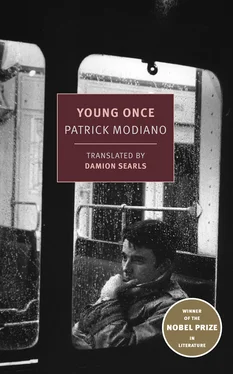She put on a record she found on the floor at the foot of the bed. Then she turned off the bedside lamp. She listened to the music, stretched out in the darkness, with the square of the window in front of her a little bit lighter. Since the crank for adjusting the radiator was missing, it was impossible to lower the heat, and she always left both sides of the double window wide open.
•
At Gare Saint-Lazare, it was night and Brossier had fallen asleep. Louis tapped him on the shoulder. They waited in their compartment for all the other travelers to leave. Then Brossier put on his old Tyrolean hat, standing in front of the mirror, while Louis took the bags down from the overhead racks: his little tin suitcase and Brossier’s garnet-colored leather bag.
There was a long line of people at the taxi stand, and Brossier suggested that they have a glass of something. They went back up rue d’Amsterdam. Louis carried the bags and let Brossier lead the way. He decided on a café whose glass surfaces, at the intersection of two streets, jutted out like the prow of a ship. Harsh light inside. Someone playing a game of pinball. They sat down at the counter.
“Two beers,” Brossier ordered, without asking Louis. “Belgian, if you have any.”
He took off his Tyrolean hat and put it on a stool next to him. Louis watched the people sliding past the windows like underwater shadows along the surfaces of a bathyscaphe, and looked at the gridlocked traffic at the intersection.
“To your health, Louis!” Brossier said, raising his glass. “Are you glad to be in Paris?”
•
She would walk down the hall, followed by the sounds of conversations and ringing telephones. People came and went, slamming the doors. A deep calm reigned in Bellune’s office, and if you stopped outside the door for a few seconds, you might think that no one was inside. There was not the least sound of a voice. Not even the clicking of a typewriter.
Bellune, standing in front of the sash window, would be smoking a cigarette. Or else sitting on the arm of one of the leather armchairs, listening to a song on a tape player. He would ask her what she thought of it, but the music and the voice would be almost too soft for her to hear a thing. One afternoon, she even surprised him pensively watching the tape unroll without finding it necessary to turn the sound on.
He had worked for the same record company for a long time and, since his role was to “discover”—in his words—“new and exceptional talents,” he promised to help her cut a record. But he seemed bored in his office. Every time she came to see him he said, in the same impatient tone of voice, “What do you say we go downstairs, Odile?”
He would take the telephone that never rang off its hook and, in the corridor, turn the key in his office door. Taking her by the arm, he would lead her to the elevator.
They would walk back up the rue de Berri toward the Champs-Élysées, he never saying a word, she not daring to disturb his reverie. Then, in a very soft voice, he would tell her the time had come for her to make a tape they could present to the record company. He had to find some good songs and he would ask a few songwriters he knew. Some “classic things,” going against the tide of what “the young people” were singing nowadays.
He would fall silent once again and, as they walked back down the street in the other direction, she would have the feeling that he had suddenly lost interest in her, maybe even forgotten she was there. She would ask him a timid question about the record but he wouldn’t answer. He would stare straight ahead: “It’s a hard business… very hard.”
He would say it so indifferently that she would wonder if this business still interested him at all.
They would arrive back at the door to number 21. Just before entering the building, he would make a plan to see her that evening.
“See you soon, Odile.”
She would linger a few seconds, hesitating, wanting to go upstairs and surprise him again, like the time when the tape was spinning in the tape player. Maybe he spent his afternoons like that, watching black bands of tape unspool in silence.
•
The hotel Brossier had chosen for him, before leaving again for another “business trip,” was located at the far end of the fifteenth arrondissement, on rue de Langeac. One room, with bath; it had a brown wood bed and a piece of paper on the wall with mauve flowers painted on it. A woman of uncertain age, with short hair, brought him up a plate of breakfast at around nine o’clock. He ate every bit, even the sugar cubes and whatever was left of the jam after spreading the rest of it on his bread. During the day, he might order a sandwich at a café counter. He had calculated that with the hundred and fifty francs Brossier had loaned him, he would last more than a week this way. By that time, Brossier would surely be back from his “business trip” and would introduce him — as he had promised — to “the important friend of mine who will give you a job.”
Ever since the interminable days he had spent in the barracks infirmary, he’d had the habit of listening to his transistor radio in its green leather case. Lying down, looking at the ceiling, he would think about the future, or in other words about nothing, while listening to the news bulletins, songs, and quiz shows, one after the other. He smoked a cigarette from time to time but tried to make the pack last, because they were expensive, these cigarettes. English, they came in metal boxes. The others had made fun of him for it back in the barracks, but he didn’t like brown tobacco.
At the end of the afternoon, he would leave the hotel with his room key in his pocket, after casting a furtive glance at the glass door to reception. The bald man with a tanned face was playing chess; all he could see of the man’s opponent was his back. Outside, he turned onto rue de la Croix-Nivert. The restaurant was far uphill, and often, along the way, he would stop at Saint-Lambert Square. There, on a bench, he would wait until dinnertime, smoking a cigarette. Brossier had given him an old gabardine coat and a tweed jacket, which came in handy: Winter that year started early and very cold, and then, with the snow, the temperature dropped even further.
The restaurant looked a bit like a dining hall because of the large tables for eight or ten, each with a label stating the name of the waiter or waitress responsible for it. He would sit at the “Gisèle” table. For nine francs, he would get an appetizer, a main dish of meat and vegetables, a dessert, and as much table wine as he wanted. A fresco ran around the walls, showing a Savoy landscape — the province where the restaurant’s owner was from.
He would exchange a few polite words with the people next to him, mostly men, some of them locals, others taxi drivers. He’d have a coffee, happy to linger in the midst of all these people, in the smoke and the kitchen smells that permeated their clothes. Rue de la Croix-Nivert. At night, he would walk all the way to boulevard de Grenelle.
At the intersection, under the elevated Métro bridge, music from a loudspeaker would be smothered by the din of bumper cars. He would stop for a moment beside the track, to watch the poles sliding along the ceiling, leaving a trail of sparks, and the pink, apple green, and purple cars. Then he would keep walking, along the median, down to the Seine.
Later, when Roland de Bejardy told him about his father, he remembered the constriction in his heart every time he passed the stairs to the Métro station before coming out onto the quai. To the left, there were new apartment buildings on the site of the old Winter Stadium, the Vélodrome d’Hiver, where he knew his father had competed in cycling races. And on the nights when he was working in Bejardy’s office and looking through old bound issues of sports magazines to pass the time, gluing the articles that mentioned his father’s name among the other Vel’ d’Hiv racers into an album, he would see himself standing alone, in front of the apartment buildings that had replaced the velodrome, with the clatter of the Métro over his head and the feeling of being nothing more than a speck of dust in the dust of boulevard de Grenelle. And yet, there was the presence of something in the air.
Читать дальше












